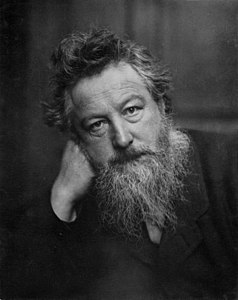Analysis of In Prison
William Morris 1834 (Walthamstow) – 1896 (London)
Wearily, drearily,
Half the day long,
Flap the great banners
High over the stone;
Strangely and eerily
Sounds the wind's song,
Bending the banner-poles.
While, all alone,
Watching the loophole's spark,
Lie I, with life all dark,
Feet tether'd, hands fetter'd
Fast to the stone,
The grim walls, square-letter'd
With prison'd men's groan.
Still strain the banner-poles
Through the wind's song,
Westward the banner rolls
Over my wrong.
| Scheme | ABXCABD CEEFCFC DBDB |
|---|---|
| Poetic Form | |
| Metre | 1001 1011 10110 11001 100100 1011 100101 1101 10011 111111 110110 1101 011110 11011 110101 1011 100101 1011 |
| Closest metre | Iambic trimeter |
| Characters | 423 |
| Words | 70 |
| Sentences | 4 |
| Stanzas | 3 |
| Stanza Lengths | 7, 7, 4 |
| Lines Amount | 18 |
| Letters per line (avg) | 19 |
| Words per line (avg) | 4 |
| Letters per stanza (avg) | 112 |
| Words per stanza (avg) | 23 |
Font size:
Submitted on May 13, 2011
Modified on March 05, 2023
- 23 sec read
- 341 Views
Citation
Use the citation below to add this poem analysis to your bibliography:
Style:MLAChicagoAPA
"In Prison" Poetry.com. STANDS4 LLC, 2024. Web. 1 May 2024. <https://www.poetry.com/poem-analysis/41107/in-prison>.


Discuss this William Morris poem analysis with the community:
Report Comment
We're doing our best to make sure our content is useful, accurate and safe.
If by any chance you spot an inappropriate comment while navigating through our website please use this form to let us know, and we'll take care of it shortly.
Attachment
You need to be logged in to favorite.
Log In